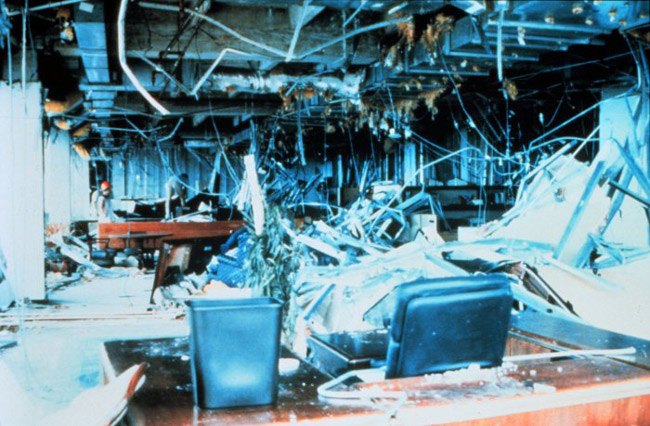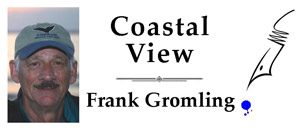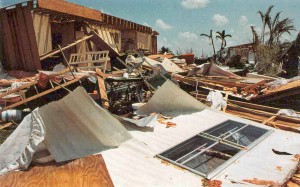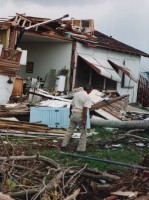
The 20th anniversary of Hurricane Andrew is next Friday, Aug. 24. As shared in last week’s column, I experienced firsthand the ravages of this category 5 hurricane. Today I describe how Andrew affected my business and what it took to recover from this powerful storm. My hope is that my experience will encourage business owners everywhere to take hurricanes seriously and improve their hurricane preparedness.
 When Andrew came ashore, my wife Bibi and I were staying with friends in an area of Dade County that was on the northern edge of the storm. While there were trees knocked down and houses suffered some damage, most of the buildings escaped serious impact and electrical service had not been interrupted.
When Andrew came ashore, my wife Bibi and I were staying with friends in an area of Dade County that was on the northern edge of the storm. While there were trees knocked down and houses suffered some damage, most of the buildings escaped serious impact and electrical service had not been interrupted.
About seven hours after the storm struck, we ventured out to check on our property and my business. As the destruction became obvious the farther south we drove, the more my apprehension increased. By the time we had traveled the 16 miles to the Turnpike Extension exit for my office, I knew my business was in trouble, but I never imagined just how much trouble.
I navigated through a scene of total destruction along SW 216th Street, which had no traffic lights or stop signs but tons of fallen trees, parts of houses, and even appliances in the roadway. The four-building business park where my company’s offices were located had borne the full impact of the hurricane. Just four miles south of ground zero, where the storm came ashore, only the exterior concrete walls and concrete slab roof were standing. A roof on one building had been peeled back by the 155-mph winds, exposing the interior to even greater damage.
The four air conditioner compressors for my building were gone from the rooftop, leaving large openings for rain. All windows and doors were blown out; everything inside the offices was destroyed. Ceiling tiles had morphed into a coating of thick fibrous slush covering the broken furniture, cabinets, and computers. I wondered how we would ever recover from such a mess. I turned away, silently prayed for the safety of my employees and sub-contractors, and drove off with Bibi in search of our home.
After surveying the damage to a townhouse Bibi owned, and taking stock of the destruction of our home, I tried to think about my business and what needed to be done to restore it. I knew this would be unlike restoring just any business because my company primarily was an electronic protection firm operating from the Keys to Palm Beach County. Its operations center and administrative offices had been in the building I had written off as a total loss two hours before. Our alarm, closed circuit television, and access control systems protected people, businesses, corporations and government agencies in four counties. I realized that I had to find the mental and physical strength to restore our services quickly, or we would be out of business forever.
Like all businesses, mine counted on talented people to make it work. For the first time, however, I realized that every one of my Dade County employees and sub-contractors lived in the hurricane devastated area and likely were facing the same, or worse, situation that Bibi and I had in front of us – everything we owned blown away in a matter of minutes.
I realized I hadn’t heard from any employee or sub-contractor. We had an emergency management plan for the business and it established a phone tree communication system whereby, in a natural disaster, employees were to contact their supervisors, who would contact their managers, who would report everyone’s status to me. Even though the company had both radio and cell phone systems in place, I hadn’t heard a word.
My cell phone worked around our house and to the north, but it didn’t function anywhere in far south Dade, where most of my people lived. I figured all telephone landlines were down, and I guessed that cell phone towers had been toppled. That would explain the failure of our phone tree system. I prayed it wasn’t anything worse, such as the injury or death of any of my people.
Gradually, I started to connect with my managers, who had heard from only a few employees or sub-contractors. I wanted a meeting to implement our recovery plans, but had no place to hold it. Besides, everyone was captured by their personal needs to stabilize their own lives and families. For another six hours I shifted between helping Bibi sift through our mess and trying to figure out how to restore the company. Dealing with the incredible scene before me, plus the mental stress of the company and its people, created a heavy burden. Coupled with high heat and humidity, and a feeling of separation created by the loss of everything tangible in my life except for Bibi and our family members who were safe out of town, I knew I had to step back and regroup.
That was when I thought of our Broward County office, safe and sound 46 miles to the north. A year before I had bought another protection company based in Davie and kept its owner and secretary in their office to handle sales in Broward and Palm Beach Counties. I realized then that the Broward office would become our new operating center, at least until we rebuilt the business in the south. This was the first positive idea in the past 12 hours.

Our employees and sub-contractors reported in over the next few days. Their personal stories were horrendous. Those living in the West Kendall, Cutler Ridge, Perrine, and Homestead areas were homeless, either because their homes were so severely damaged or completely gone. About half of my people said they could not come back to work until they settled their personal situations. I knew this would be weeks or months. They needed housing, food, water, clothing, gasoline, and medicines. I realized that, most of all, they needed cash. With the electrical grid destroyed, banks and credit cards were useless in our half of Dade County.

Our service vehicles miraculously survived the storm and enough technicians returned to work to enable us to continue servicing our customers outside the destruction area and those customers whose homes or businesses were only slightly damaged by the storm. This gave the technicians and office staff something to focus on other than their problems and it generated some cash for the business and them, too.
Our construction division customers, 14 home builders, with only one exception, had developments north of the hurricane zone, so with returning employees and sub-contractors, plus some new hires, we were able to resume work for them. This was an important part of our revenue source, so having this portion of the business restored was critical for our recovery.
But we lost thousands of dollars per month in monitoring revenue from over 1000 customers whose properties were destroyed. This was a major hit to our financial stability, but there was nothing we could do except look for ways to make up for it by adding new business outside the hurricane zone. Our Broward sales office was given higher sales quotas and, fortunately, the staff responded.
I knew we had to re-establish a Dade County office and realized that hundreds of other businesses struck by the storm also would be seeking space. We found an office in an attractive building on Sunset Drive (SW 72nd Street), about 10 miles north of our former office.
We bought everything we needed to make our new 2,000 square foot office efficient, effective, attractive and comfortable. Fortunately, our company had a policy of recording two copies of our computer files each day, with both disks going home, one with the office manager and one with me. From my international security experience with businesses and governments in high risk countries, I knew the value of having important records off-site. The only problem we had now was there were no computers onto which we could re-store the data. Ours were strewn about the office, rained on, and had ceiling mush blown into them.
Somehow a computer-repair wizard I knew in Broward managed to salvage our servers, saving us at least $25,000 in hardware, software and re-programming time. I paid his $500 bill in cash, which I seemed to be carrying a lot of these days.
Over the ensuing weeks, and months, we enacted most of the steps in our emergency management plan. We settled into our new space and began to forge a new work dynamic as we realized the old business was gone forever. The new business was an even more exciting place to work. We met often to talk business and, perhaps more importantly, just to talk. Everyone had stories to share about their personal rebuilding experiences – insurance claims, availability of housing, essential supplies, and building materials, long drives for gas and cash, life without electricity, and dealing with tense emotions. Stress was the rule in their lives.
While we could never forget what had occurred, we moved beyond it, some of us better than others. We lost a few people who moved out of Dade County, even a few who left Florida. But, we gained something, too. We gained a connectedness, a kind of cohesiveness that comes from tragedy. We had survived and, together, we were not just rebuilding our company but actually building a new company that would be better in every way for ourselves and for our customers. That is the major lesson we learned from Hurricane Andrew. That, and the importance of having a plan.
Next week’s Coastal View will look at all of the lessons I learned from Hurricane Andrew, both personal and business. Plus, I will connect them to Flagler County, or any county for that matter, in order to show what might happen if a large hurricane chose our area for its landfall.
Until then, be well and do something positive for nature.
![]()
Frank Gromling is the owner of Ocean Publishing in Flagler Beach. Reach him by email here.





























Julie Murphy says
My goodness this all brings back memories of my aunt (now passed) who lived through it and my niece who still lives in the area. Praying that Isaac passes you by…or dissipates before getting closer.